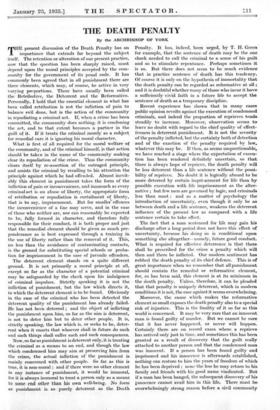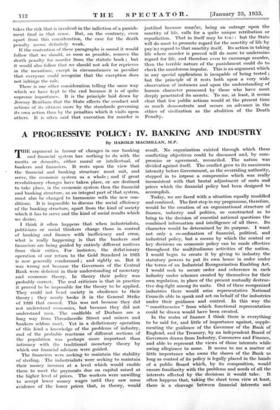THE DEATH PENALTY
By the ARCHBISHOP OF YORK THE present discussion of the Death Penalty has an importance that extends far beyond the subject itself. The retention or alteration of our present practice, now that the question has been sharply raised, must depend upon the moral principles accepted by the com- munity for the government of its penal code. It has commonly been agreed that in all punishment there are three elements, which may, of course, be active in very varying proportions. These have usually been called the Retributive, the Deterrent and the Reformative. Personally, I hold that the essential element in what has been called retribution is not the infliction of pain to balance evil done, but -is the action of the community in repudiating a criminal act. If, when a crime has been committed, the community does nothing, it is condoning the act, and to that extent becomes a partner in the guilt_ of it If it treats the criminal merely as a subject for remedial care it is ignoring his moral character.
What is first of all required for the moral welfare of the community, and of the criminal himself, is that action should be taken in the name of the comnumity making clear its repudiation of the crime. Thus the community clears itself by re-assertion of the outraged principle, and assists the criminal by recalling to his attention the principle against which he had offended. Almost inevit-. ably this element in punishment takes the form of the infliction of pain or inconvenience, and inasmuch as every criminal act is an abuse of liberty, the appropriate form of retribution or repudiation is curtailment of liberty, that is to say, imprisonment. But for smaller offences the inconvenience of a fine may serve, and in the case of those who neither are, nor can reasonably be expected to be, fully formed in character, and therefore fully responsible for their conduct, it is both proper and just that the remedial element should be given so much pre- ponderance as is best expressed through a training in the use of liberty rather than the removal of it. This, no less than the avoidance of contaminating contacts, is the ground for substituting special schools or proba- tion for imprisonment in the case of juvenile offenders.
The deterrent element stands on a quite different ground. It is not primarily a moral principle at all, except so far as the character of a potential criminal may be safeguarded by the check upon his indulgence of criminal impulses. Strictly speaking it is not the infliction of punishment, but the law which directs it, in which the deterrent element is to be found. Obviously in the case of the criminal who has been detected the deterrent quality of the punishment has already failed. He has not been deterred ; and the object of inflicting the punishment upon him, so far as the aim is deterrent, is not to deter him but to deter other people. It is, strictly speaking, the law which is, or seeks to be, deter- rent when it enacts that whoever shall in future do such and such things shall suffer such and such consequences.
Now, so far as punishment is deterrent only, it is treating the criminal as a means to an end, and though the law which condemned him may aim at preserving him from the crime, the actual infliction of the punishment is mainly concerned with other people. So far as this is true, it is non-moral ; and if there were no other element in any instance of punishment, it would be immoral, for it is always immoral to treat a person only as a means to some end other than his own well-being. No form as punishment is so purely deterrent as the Death Penalty. It has, indeed, been urged, by T. H. Green' for example, that the sentence of death may be the one shock needed to call the criminal to a sense of his guilt and so to stimulate repentance. Perhaps sometimes it is so. But there does not seem to be much evidence that in practice sentence of death has this tendency. Of course it is only on the hypothesis,of immortality that the death penalty can be regarded as reformative at all ; and it is doubtful whether many of those who incur it have a sufficiently vivid faith in a future life to accept the sentence of death as a temporary discipline.
Recent experience has shown that in many cases public opinion revolts against the execution of condemned criminals, and indeed the proportion of reprieves tends, steadily to increase. Moreover, observation seems to leave no doubt with regard to the chief quality of effect- iveness in deterrent punishment. It is not the severity of the penalty inflicted, but the certainty both of detection and of the exaction of the penalty required by law, whatever this may be. If then, as seems unquestionable, we have reached a stage where the expectation of execu-. tion has been rendered definitely uncertain, so that there is always hope of reprieve, the death penalty will be less deterrent than a life sentence without the possi- bility of reprieve. No doubt it is logically absurd to be more deterred by certain imprisonment for life than by possible execution with life imprisonment as the alter- native ; but few men are governed by logic, and criminals less than most : and as a matter of psychology the introduction of uncertainty, even though it only be as between death and a life sentence, weakens the deterrent influence of the present law as compared with a life sentence certain to take effect.
The fact that a man sentenced for life may gain his discharge after a long period does not have this effect of uncertainty, because his doing so is conditional upon something else altogether—namely, future good conduct. What is required for effective deterrence is that there shall be prescribed for the crime a penalty which will then and there be inflicted. Our modern sentiment has robbed the death penalty of its chief defence. This is of great importance when we remember that all punishment should contain the remedial or reformative element, for, as has been said, this element is at its minimum in the death penalty. Unless, therefore, it can be pleaded that that penalty is uniquely deterrent, which in modern conditions it is not, the case against it seems overwhelming.
Moreover, the cause which makes the reformative element so small exposes the death penalty also to a special risk of injustice. This is the finality of it so far as this world is concerned. It may be very rare that an innocent man is found guilty of murder. But we cannot be sure that it has never happened, or never will happen. Certainly there are on record cases where a reprieve has arrived only just in time, and sometimes this has been granted as a result of discovery that the guilt really attached to another person and that the condemned man was innocent If a person has been found guilty and imprisoned and his innocence is afterwards established, nothing can restore to him the years of freedom of which he has been deprived ; none the less he may return to his family and friends with his good name vindicated. But if a man has been hanged, the subsequent discovery of his innocence cannot avail him in this life. There must be overwhelmingly strong reason before a civil community takes the risk that is involved in the infliction of a punish- ment final in that sense. But, on the contrary, even apart from this consideration, the case for the death penalty seems definitely weak.
If the contention of these paragraphs is sound it would follow that we should, as soon as possible, remove the death penalty for murder from, the statute book ; but it would also follow that we should not ask for reprieves in the meantime, except in 'circumstances so peculiar that everyone could recognize that the exception does not infringe the rule.
There is one other consideration telling the same way which we have kept to the end because it is of quite supreme importance. It is the principle laid down by Jeremy Bentham that the State affects the conduct and actions of its citizens more by the standards governing its own action than by the penalties which it visits upon others. It is often said that execution for murder is justified because murder, being an outrage upon the sanctity of life, calls for a quite unique retribution or repudiation. That in itself may be tiu2 : but the State will do most to promote regard for the sanctity of life by paying regard to that sanctity itself. Its action in taking life where murder is proved will do more to undermine regard for life, and therefore even to encourage murder, than the terrible nature of the punishment could do to check the murderous impulse. This is an argument which in any special application is incapable of being tested ; but the principle of it rests both upon a very wide observation of instances and upon the understanding of human character possessed by those who have most deeply penetrated its secrets. To me, at least, it seems clear that few public actions would at the present time so much demonstrate and secure an advance in the ethics of civilization as the abolition of the Death Penalty.















































 Previous page
Previous page